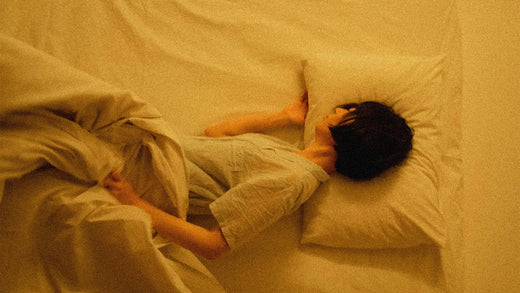Get to Know the Circadian Rhythm

We know how much you love our Dream and Chill gomitas when it’s time to wind down, but today, we want to go deeper than just gummies. Sleep isn’t just about getting enough hours; it’s about getting quality sleep that leaves you feeling rested and ready to take on the day. And that all comes down to your circadian rhythm—your body’s natural clock that decides when you sleep, wake up, and everything in between.
Sometimes, life throws that clock off balance, and suddenly, you’re stuck tossing and turning or waking up feeling like you didn’t sleep at all. When that happens, it’s time to take action. We’re here to talk about what your circadian rhythm really is, how it affects your sleep, and, most importantly, what you can do to get back on track. Whether you use our gomitas or just need a few lifestyle tweaks, we’ve got you covered.

What Is the Circadian Rhythm?
Circadian rhythm has a poetic ring to it, but really, it’s just a 24-hour internal clock that your body runs on. It regulates everything from when you sleep and wake up to when you eat, how your mood fluctuates, and even your metabolism. It’s like your body’s built-in schedule, synced to natural light and darkness.
When your circadian rhythm is in sync, everything works smoothly—you feel energized during the day, your sleep feels restorative, and your body knows when to switch gears between rest and activity.
But when your circadian rhythm gets thrown off (and let’s be real, it often does), it can mess with your entire system. Imagine your body’s clock is set to the wrong time—it leads to groggy mornings, restless nights, and just an overall ‘meh’ feeling. Things like inconsistent sleep patterns, stress, or even the blue light from our screens can disrupt this natural cycle, making it tough for your body to know when it’s time to rest or be alert.
In fact, studies show that irregular circadian rhythms can not only impact sleep quality but also affect your mood, cognitive function, and even your immune system. So, it’s more than just a bad night’s sleep—it’s about maintaining your body’s overall health.

Why Does the Circadian Rhythm Get Messed Up?
Life happens. Stress, work, Netflix binges—these are just a few culprits. And let’s not forget about blue light exposure. Staring at screens late at night can trick your brain into thinking it’s daytime, which means your melatonin (the sleepy-time hormone) doesn’t get the signal to kick in. If your schedule is all over the place, your circadian rhythm can get a bit confused, making it harder to fall asleep and wake up on time.
And sure, a lot of people turn to our gomitas to help them fall asleep and stay asleep longer—and they work! Our Dream gomitas contain CBN, a cannabinoid well-known for helping you wind down and catch some Zzzz’s.
But here’s the thing: they’re a great tool, not a magic cure for insomnia. Over-relying on them without fixing the root cause (like a messed-up sleep schedule) can lead to poor sleep quality over time.
So, what can you do to protect your circadian rhythm and get your sleep back on track? We’ve got some tips for you—gomitas included.

Tips to Get Your Sleep On Track
-
Set Consistent Sleep and Wake Times
It might sound boring, but setting fixed times to go to bed and wake up (yes, even on weekends) helps regulate your circadian rhythm. It’s like giving your body a reliable schedule to follow, and it seriously improves sleep quality. -
Avoid Sleep Disruptors
Limit alcohol, caffeine, and nicotine, especially in the afternoon. And try to keep your bedroom a sleep-only zone—no scrolling TikTok under the covers. -
Wind Down Before Bed
Start winding down about an hour before you plan to hit the hay. Turn off devices, dim the lights, and do something calming, like reading or meditation. And hey, this is a great time for a Dream gomita to get you in the zone. -
Keep Naps Short and Sweet
If you’re a napper, keep it to 15-20 minutes and aim for early afternoon. Too much daytime snoozing can make it harder to sleep at night. -
Exercise Regularly
A bit of physical activity goes a long way in helping you fall asleep faster and improving overall sleep quality. Just don’t go hardcore right before bed. -
Minimize Blue Light Exposure at Night
Blue light messes with your melatonin levels, so avoiding screens an hour before bedtime can make a big difference. If you absolutely need to be online, turn on night mode or use a blue light filter. -
Get Your Morning Sun
Natural sunlight in the morning helps set your body’s clock for the day. It boosts your alertness and makes it easier to wake up naturally. Get outside first thing in the morning and get that Vitamin D. -
Try Blue Light-Blocking Glasses
If you’re stuck working late or can’t resist a little nighttime screen time, these glasses can help reduce blue light’s impact on your sleep. It’s not magic, but it’s a step in the right direction.
Sweet Dreams
Sleep is one of the best things you can do for your body and mind, and getting your circadian rhythm in check is a solid first step. Our Dream gomitas are here when you need them, but remember, they’re just one piece of the puzzle. Pair them with these tips, and you’ll be on your way to a deeper, restorative sleep. (But seriously…stop scrolling, go to bed.)


